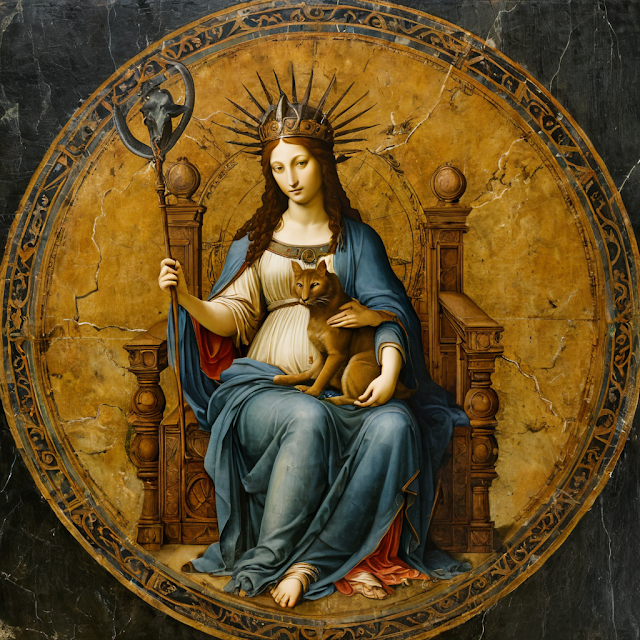Hecate

STORY BY GOOGLE GEMINI PRO
Hecate, a powerful and enigmatic figure in Greek mythology, is a goddess associated with magic, crossroads, the night, and the underworld. Her origins are somewhat obscure, with various accounts suggesting different lineages. Some sources identify her as the daughter of the Titans Perses and Asteria, while others claim she is the offspring of Zeus and Hera or Zeus and Demeter.
Despite the uncertainty surrounding her parentage, Hecate's significance in the Greek pantheon is undeniable. She was a revered goddess known for her vast knowledge and powers over the earthly, celestial, and underworld realms. Unlike most other Titans, who were overthrown by the Olympian gods, Hecate retained her authority and influence, a testament to her power and wisdom.
Hecate's connection to the night and the underworld adds another layer to her mystique. She is often portrayed as a nocturnal figure, wandering the earth after dark, accompanied by howling dogs and restless spirits. This association with the unseen and the liminal makes her an influential figure in rituals and invocations related to the underworld and the mysteries of life and death.
In addition to her role as a goddess of magic and the underworld, Hecate was also considered a protector of women, children, and the home. She was often invoked for her assistance in childbirth, protection from evil spirits, and blessings for the household.
Hecate's enduring popularity is evident in her continued presence in modern spiritual practices. She is often revered as an influential figure of female empowerment, a symbol of the mysteries of life and death, and a guide for navigating the crossroads of life.
In conclusion, Hecate's story is one of power, mystery, and transformation. Her diverse roles as a goddess of magic, crossroads, the night, and the underworld make her a fascinating and enduring figure in Greek mythology and beyond.
ANIMALS AND PETS
Hecate is associated with animals and pets in various ways.
Her connection to dogs, particularly black female dogs, is perhaps the most prominent. In ancient times, dogs were offered to Hecate at crossroads, her sacred spaces. They were seen as her companions and guardians, accompanying her on her nightly wanderings. Dogs are also associated with the underworld and death, connecting them to Hecate's domain.
Other Animals: While dogs are the most common, Hecate is also linked to other animals, such as horses, cows, owls, snakes, and bees. This association reflects her role as a goddess of the natural world and her power over different aspects of it.
Symbolic Animals: Some animals have symbolic meanings connected to Hecate. For instance, the polecat or weasel is associated with her due to a myth where a woman is transformed into a polecat by Hecate. This connects Hecate to transformation and the unseen aspects of life.Modern Interpretations: In modern times, Hecate's connection to animals has expanded to include pets in general. She is sometimes invoked as a protector of animals and a guide for those who work with them. Her association with dogs is still prominent, and many people who work with dogs or rescue organizations may seek her guidance and protection.
Hecate's connection to animals is a multifaceted aspect of her mythology and worship. It reflects her power over the natural world, her connection to the underworld, and her role as a protector and guide.









Comments
Post a Comment